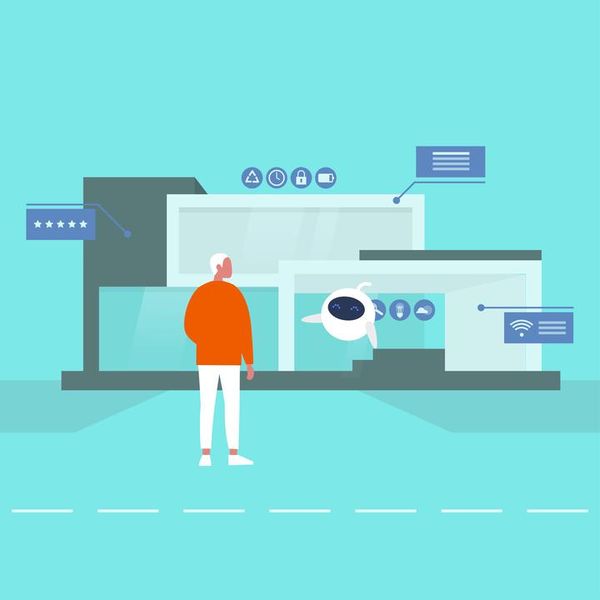Making a Difference: Impact Stories from the Department of Informatics
Academics from the Department of Informatics are conducting world-leading research with measurable impact: 1) an AI planning tool that makes drilling safer, faster, and more environmentally friendly, 2) the development of robotic therapy devices for the treatment of lower limb injuries, 3) pioneering 5G research that impacts global telecommunications industry and 4) research on provenance, a fundamental data governance technique that provides a reliable account of a system’s actions and the data it altered. Read more about the four inspiring stories showing the impact of our research.

1) AI planning research enables Schlumberger to achieve long-term goal of drilling automation
Automated plan construction and execution, developed by King’s researchers, has enabled Schlumberger, a Fortune 500 Oil & Gas (O&G) Services Company, to deploy automated drilling capabilities, a technology that no other company is yet capable of providing. This has brought the company improvements in efficiency, consistency and safety, along with a competitive edge. King’s research in automated planning and plan-execution has enabled Schlumberger to fulfil a longstanding ambition in the O&G industry to increase drilling automation, applicable to geothermal and exploration wells. King’s work on the AI planner has become the core of Schlumberger’s automation products and services - in the short term the company has plans to rollout the approach across the organisation, and ultimately aims to make this the industry standard for drilling automation.
You can read more about our research here and find out more about its impact here.
The underpinning research is conducted by:
2) Healthcare and commercialization impact through innovative technologies for robotic rehabilitation
Research led by Professor Jian Dai on the design of robot manipulators has led to the development of robotic therapy devices for the treatment of lower limb injuries. Two companies have been founded to develop cutting-edge healthcare technologies based on this research: Movendo Technology (Italy), a large biomedical company which provides rehabilitation devices and effective rehabilitation treatment, and AiTreat Pte Ltd. (Singapore), a cutting-edge robotic massage start-up. An independent evaluation has found that the robotic devices developed by these companies provide treatment equal to or better than conventional physiotherapy, but at lower cost and more reliable consistency, in particular for diagnosing susceptibility to falls in older people, rehabilitation for patients with Parkinson’s disease after spinal injury and stroke, and rehabilitation after lower limb trauma.
In total, more than 11,000 patients have been treated with these robotic devices at over 100 clinics and hospitals in countries including Singapore, Italy, Germany, Czech Republic, Netherlands, Spain, US, Dubai, Canada, Greece, Saudi Arabia, Puerto Rico, Switzerland and Ukraine with over 800,000 physiotherapy treatments have been delivered.
You can read more about our research and about its impact here.
The underpinning research is conducted by:
3) Pioneering 5G research impacts global telecommunications industry
Mobile connectivity is truly pervasive and underpins a wide range of commercial and societal applications. Telco has thus become a trillion-pound industry with 2G-4G mobile networks serving more than eight billion connections today. 5G systems were seven years in the making and are now being deployed with an expected market value of GBP500,000,000,000 by 2030. To this end, King’s fundamental research contributions on 5G telecommunication systems impacted industry and standards developments alike: Ericsson and King’s have engaged in close joint research, innovation and deployment/experimentation over the past seven years. King’s played an instrumental role in gauging early 5G architecture capabilities and translating them into viable societal use cases.
Konica Minolta (KM) is a market leader in enterprise printing products. King’s has engaged with KM over a years-long engagement. The roadmap developed by Prof M Dohler in 2014-2015 outlined a set of opportunities for Konica Minolta around Distributed Cloud Intelligence. 3GPP¬: King’s provided standards-essential contributions to two standards on converged 5G architectures, which provide significant benefits in terms of customer experience and affects all network and broadband providers globally. GSMA: King’s introduced cost- saving Generic 5G Slice Templates, initially included in the de-facto industry guidebook and which are now being adopted by telecoms operators globally.
You can read more about our research here and find out more about its impact here.
The underpinning research is conducted by:
4) Provenance - A fundamental data governance technique
Provenance is a record of the processes by which data was produced, by whom, how, and from what other data. Research on provenance at King’s over a decade, and later significant and sustained world-wide adoption, often without King’s direct involvement, have led to the global recognition that provenance is a critical facet of good data governance for businesses, governments and organisations in general. The impact of King’s pioneering work has manifested itself in i) commercial, governmental and research organisations launching new products incorporating provenance functionality, ii) multiple standardisation bodies providing guidance to software engineers, iii) scientific communities coalescing around provenance to ensure trusted information exchange, and iv) regulators asserting that provenance is a technique to address regulatory requirements. Overall, due to King’s research, provenance is now widely regarded as an essential function of an IT system, to provide a trusted account of what the system performed and the data it manipulated.
You can read more about our research here and find out more about its impact here.



